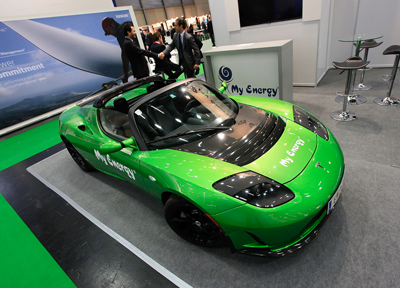Minister for Communications, Energy and Natural Resources Pat Rabbitte, TD, speaks at the EWEA 2013 conference this morning
Ireland’s Energy Minister Pat Rabbitte, TD, was in Vienna this morning to speak at the opening of the European Wind Energy Association’s (EWEA) annual wind energy event, where he told representatives from the industry how wind energy will play a significant role in Europe beyond 2020 and that investors could invest in it on a “no regrets” basis.
Rabbitte, who is president of the EU Energy Council during Ireland’s presidency of the EU, started off his speech by covering how, in Ireland, 18pc of the country’s electricity consumption came from wind-generated electricity in 2012.
He said wind energy will have a significant role in every EU member state’s national renewable energy action plan.
“The scenarios envisaged in the commission’s Energy Roadmap 2050 foresaw continuing significant development of renewable energy up to 2050 as a ‘no regrets’ option, that is, an emission-reduction option with net negative costs.
“It is clear that, given its potential in so many countries, wind energy will continue to play a key role,” he said.
Acknowledging how the wind-energy industry would like certainty about the landscape post-2020 in order to make investment decisions, Rabbitte said it was too early to expect a final decision.
“Some states would prefer an overall low-carbon target without a separate renewables target while others, including Ireland, favour a continuation of the current regime. Governments need to finalise their thinking, while recognising that the content and timing of our decisions are critically important to the trajectory for renewable energy,” he said.
EU debates
Rabbitte spoke about debates in Europe at the minute, including on the reform of support schemes and on the use of co-operation mechanisms.
“We expect guidance from the commission on both these topics in the first half of this year,” he said.
He also touched on the reform of markets and the new infrastructure needed to create single electricity and gas markets in Europe.
“As we increase the amount of renewable energy in the electricity mix, we need the physical ability to trade it and payment mechanisms that are sufficiently flexible and robust to respond to cope with such a mix,” explained Rabbitte.

Electric sports car on display at EWEA 2013
Trading wind energy
Turning to the scope for international trade in renewable energy, Rabbitte talked about the recent memorandum of understanding he signed with the UK’s Secretary of State for Energy and Climate Change to progress plans for the trading of renewable energy between both countries.
“As we move from an island-based, standalone energy system to a more interconnected and integrated single market, Ireland now has a real opportunity to develop our abundant natural resources and to become a renewable electricity exporter of scale,” he said.
Rabbitte said that pending an agreement between the two governments, nothing has yet been decided.
“If we can reach agreement, then a transparent procedure for project selection will be needed in order to decide what projects get the go-ahead,” he said.
Finally, Rabbitte said there are challenges facing the wind sector, but he said the growth in wind energy in recent years reflects that the European policy environment has provided a sound basis for investment.
“For the period beyond 2020, I believe one thing is clear: renewable energy will continue to play a significant role and we can plan for it and invest in it on a ‘no regrets’ basis,” he added.